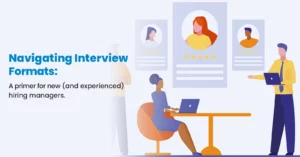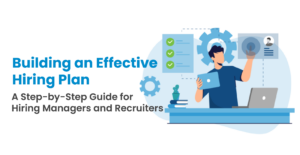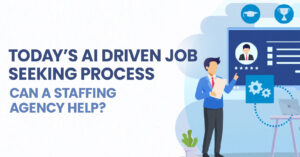When an organization identifies the need to bring talent quickly and cost effectively into its workforce, employers have several common types of job interviews they can choose from to screen candidates. Selecting the right job interview type, however, will depend on the experience, knowledge and skills required for the job.
The way in which staffing and HR professionals manage the candidate experience has changed in the age of remote work and hybrid work models; however, the different types of job interviews required to find the right candidate for a job remain the same, even if performed from afar — for now.
Why are different types of job interviews important?
Depending on the nature of the job, having experience in, or knowledge of, the different types of job interviews is important so that recruiters and hiring managers can identify the best candidate for the role.
All Interviews, however, have their own advantages and disadvantages and come with their own unique set of questions that will reveal different qualities about the candidate.
Choosing an appropriate type of interview and interview questions requires taking into consideration what skills, knowledge and experience are required to perform the job – both technical skills and soft skills. These softs skills include things like, social disposition, ability to think quickly and adapt to situations, willingness to learn and more.
Types of job interviews
Interviews come in all shapes and sizes, and choosing the right one will depend on the type of job.
Candidate selection is a highly dynamic and often time consuming process. However, there is a variety of interview formats that are available to support this process, and each type will have questions designed to reveal different pieces of information on a candidate’s suitability.
Choosing the right kind of interview and questions can make all the difference when identifying a successful match for a role.
Each interview type and its associated questions can be great options depending on the resources you have available, how many applicants you have and how qualified your candidates are.
Here are the most common job interviews recruiters and hiring teams can choose from when screening candidates.
Phone Interview
A phone interview is often used to pre-screen candidates as the first step in the selecting a candidate for an in-person interview.
In a phone interview, it’s important to ask questions that gain facts about the candidate’s skills and experience while also establishing a rapport that would indicate if the candidate would be a good fit for the organization.
How it works
These job interviews use direct questions to find out if a candidate would fit the organization’s culture and to gain a general understanding of whether or not the candidate has the communication skills, work experience, and overall suitability for the job.
This interview format can be deemed by either party to not be a good fit for the role based on information shared. This makes the phone interview very important as it is less time consuming and has less scheduling parameters than an in person interview, this can save time and money for those candidates that are interested and would be a good fit for the next stage in the process.
Who’s involved?
If an organization has not engaged the services of a staffing agency, a member of the organization’s Human Resources team will initiate the call.
One-on-one / In-person / Traditional interviews
These are the interviews that most candidates are familiar with. Typically following the phone screening interview, one-on-one/in-person/traditional interviews are used to establish whether candidates have the requirements for the position as listed against their resume and phone screening interview.
How it works
For this type of job interview, the interviewer will ask questions and get a feel of the candidate’s work history, skills match, education for the job requirements as well as applicant’s interest in the position.
If the interviewer is satisfied, the candidate may be offered the position on the spot, offered the position shortly after or asked to move onto the second interview.
Who’s involved
This interview type is conducted with the candidate alone usually in the conference room, interview room or employer’s office. The interviewer is typically the Manager, Team Lead or Supervisor of the position the candidate is being considered for.
Video Interviews
For many recruiters and hiring teams, the new normal means transitioning from the one-one-one/in-person/traditional interviews to video interviews, or remote interviews, in order to screen candidates.
In fact, a recent survey finds that as of May 2020, 84 per cent of recruiters were in the process of adapting their hiring processes to facilitate remote exchanges.
Similar to phone interviews, this job interview process uses video-conference technology such as, Microsoft Teams, Skype, Zoom, Google Hangouts, Slack or other software to allow the interviewer to engage candidates from different locations.
How it works
When it’s time to interview candidates during these types of interviews, it’s important make sure to give the impression that the video interview is just as serious and professional as an in-person interview – even if you’re conducting it from your kitchen with a virtual background. This means dressing just like you would in an office interview with your phone off and resources (like their resume, the job posting, culture pitch, your interview questions, list of participants, etc.) ready.
To provide the best candidate experience during this job interview type, it’s important to make sure that you take notes during the interview and use the same body language and verbal communication skills you would during a traditional job interview.
Who’s involved
If an organization has not engaged the services of a staffing agency, a member of the organization’s HR team will initiate the video interview and bring any other participants on in the meeting who may be involved.
Sequential / Serial / Multiple Interviews
Larger organizations will, typically, require a longer acquisition process than a smaller company. This process will involve multiple interviews that can combine a one-on-one interview, a group interview and/or a panel interview.
Panel interviews will involve one or more members of the hiring team. Typically for these types of interviews, a member would include the manager of the department, a HR representative, managers of collaborating departments, and/or other decision makers. In a panel interview, each member should have a list of his or her own detailed questions.
How it works
Throughout the different stages of this interview process, the goal is to test a candidate’s personality, skills and overall fit within the organization, while also ensuring they are consistent in their answers.
A sequential interview may take place during one day, over the course of several days or even longer.
This interview process can consist of two to five interviews; however, only the top candidates from previous interviews will interact with higher ranking personnel for greater efficiency.
Who’s involved?
This type of interview is often initially performed with multiple stakeholders. If the candidate is successful, he or she may meet with other members of the team, such as an HR representative, Team Lead, Manager, team member or owner.
To obtain the qualifying information they need to ensure the best fit, each interviewer may concentrate on aspects of the job relating to their own role in the company.
Career / Job Fair Interview
As career and job fairs are on pause, these interviews aren’t as common right now as they once were. However, they are a valuable resource when looking to engage a vast majority of potential candidates in a single location and potentially obtain interviews with qualified candidates on the spot.
A career or job fair is also a valuable tool that recruiters and HR professionals can use to grow their networking, relationship-building and employer branding opportunities to attract an increasing pool of these potential candidates.
How does it work?
An organization will send HR representatives, or similarly – a staffing company will send their recruiters on behalf of a client company, to set up a booth at the location of the event. If a candidate expresses interest in any opportunities presented, the interview will typically last between two – 10 minutes in length to determine whether there is mutual interest, the candidate is qualified and if another interview should follow.
Who’s involved?
A Human Resources team member, Recruiter or a technical manager in the field will usually be on-site to represent the company and act as the interviewer at this type of event.
The interview process can seem tricky, and preparation is key to effectively sourcing and screening the right fit.
When the effects of a bad hire will cost an organization 30 per cent of that worker’s first year salary, it’s essential that a company chooses from one of these common types of interviews to appropriately assess the qualifications of candidates.
The Voice of Talent: Return to the Office Report
Procom recently surveyed over 1,000 knowledge workers to discover how and where they prefer to work as offices re-open across North America.
The Voice of Talent Report offers actionable insights into what workers expect in relation to mandatory vaccinations, remote work preferences, The Great Resignation, COVID-19 safety measures and more.
Access your complimentary copy to discover how to attract talent in a post pandemic world:
{{cta(‘876b6743-23dc-425b-b245-80dba677a9c7′,’justifycenter’)}}




